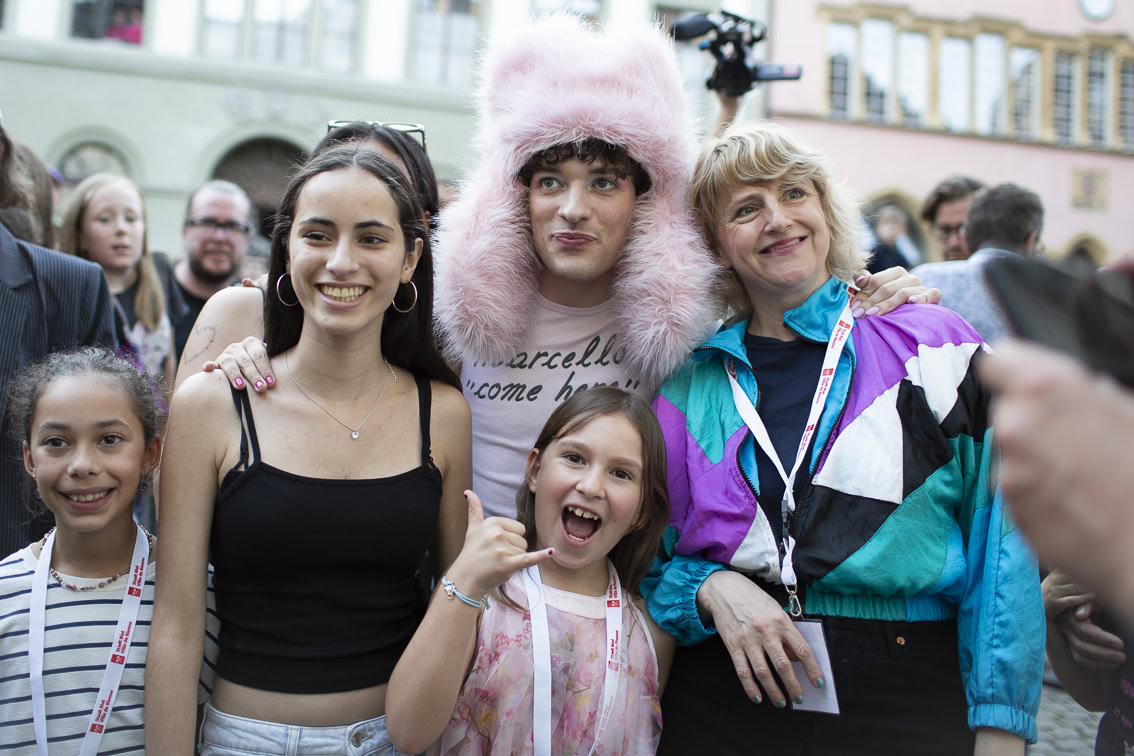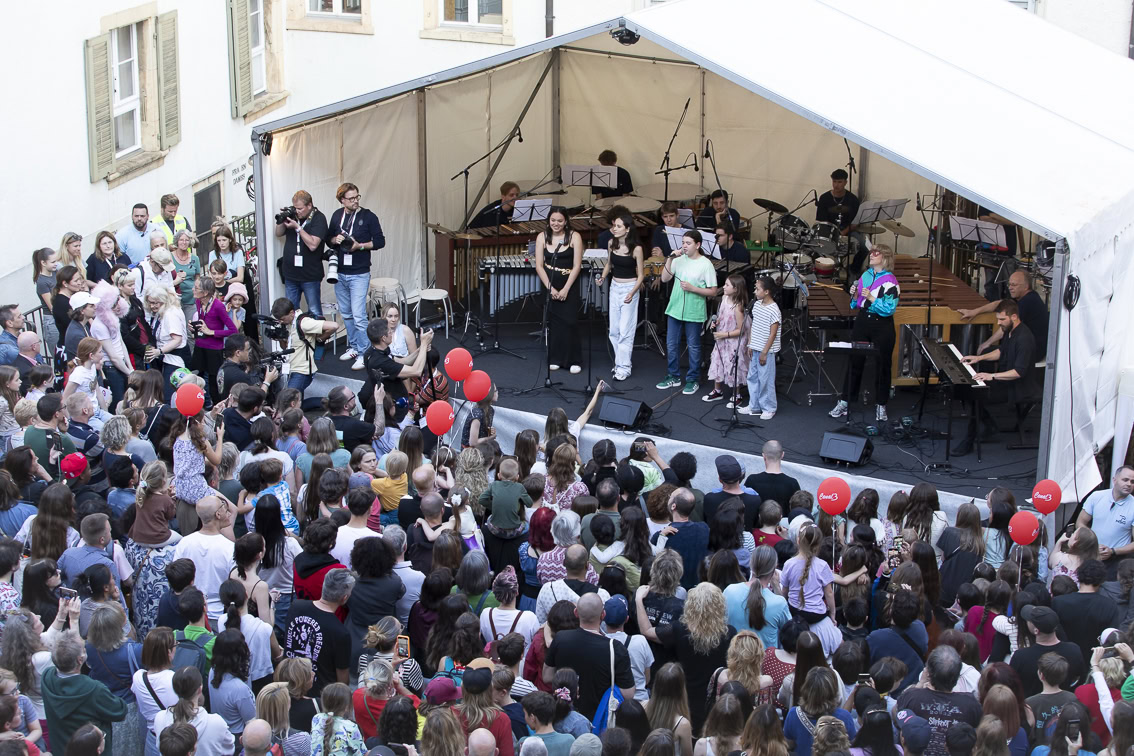"A mega important job!" Nemo thanks the Biel School of Music
Five weeks after his victory at the Eurovision Song Contest (ESC), the town of Biel organized a big party to welcome Nemo. The Biel School of Music, where the artist has attended classes for many years, was also present. Luca Carangelo, a member of the school management, and Helena Danis, music teacher, give an overview of this event, which went far beyond the daily routine of the music school.

"It's a unique experience," explains Luca Carangelo, one of the four members of the Biel music school board. On June 17, the school was able to put on a twenty-minute show at the Nemo reception party in Biel. Two groups led by teachers who had taught at the Biel School of Music performed for the festive audience and Nemo. The first group, made up of nervous and joyful singing students, some of whom were already Nemo fans before the CEC, performed Medley arranged by Helena Danis, to the delight of the audience that had packed the Place du Bourg. The second group, an ensemble of percussionists led by Richard Lepetit, brought plenty of groove to Biel's old town.
Nemo was visibly moved by the performances. "Passing on the motivation and pleasure of making music to the next generation is a huge task," said the musical talent to the music teachers. "Thank you for what you do, it's a mega important job!". Nemo also personally thanked the music students, stressing that his own performances with the music school hold a special place in his heart.
"We're extremely pleased that everything went so wonderfully well," says Luca Carangelo. Two weeks earlier, the City of Biel's Department of Culture had contacted the music school, as Nemo had been taking lessons with the children's choir and percussion ensemble, as well as in singing and piano. To introduce Biel's schoolchildren to what the school has to offer, every year the music school organizes a trip to the music school for classes in grades 1 and 2.re to 6e year of a selected elementary school in and around Biel/Bienne. It's quite possible that this event, which had a national impact, helped to raise the profile of the school considerably. In any case, just a few days after the show, the music school received the first letters from fans to forward to Nemo.

Interview with Nemo's singing teacher
At the age of sixteen, Nemo already knew that music would determine his life - the future star was supported by teachers at the Biel Music School, among others. Singing teacher Helena Danis talks about her approach to students with particularly lofty ambitions, but also about the many advantages that teaching singing also brings to the normally gifted.
Helena, you've been teaching singing for over twenty years, and ukulele for the last two. How important is teaching in your life?
On average, I teach for three days at the music school in Biel. Aside from that, I'm involved as a musician myself, previously in electro-pop projects, now with song shows.
Encouraging talent is an important aspect for music teachers. How do you support gifted students?
I encourage them to learn an instrument, such as guitar or piano, alongside singing, so that they can accompany themselves and write their own songs. In addition to the instrument, music theory and solfeggio are also important, as is stage experience. The Biel School of Music offers a wide range of courses for ensembles and groups.
Do you consider it a great responsibility to encourage gifted students?
Absolutely. We often take stock and talk things over with the parents too. I try to get them out of their comfort zone, but always in such a way as to keep the fun and motivation high. I don't want to overload them, because there's a lot to do at school too. It's important to bear in mind that, when it comes to singing, individual levels of development vary greatly. Some students already have an incredible voice at the age of 12, while for others it comes later. I give them as much time as they need. The most important thing is to keep them involved.
Do you have many students who decide to study at a university?
I'd say that about one student every two to three years goes on to study at a university or musical theatre school. It's great to keep track of them - sometimes you suddenly find yourself, or learn that they've been performing with colleagues.
Does this mean that nurturing talent is rewarding, but also tiring?
Yes, absolutely. You're always in dialogue with other teachers, and you also have to keep up to date, including on the ever-changing requirements for university studies.
You accompanied Nemo. What was your impression of Nemo as a student?
That was in 2016. At the time, Nemo had made a name for himself as an interpreter of rappers on the Swiss television show "Die grössten Schweizer Talente", and was very busy, always on the move between Biel, Berne and Zurich. Nemo wanted to renew his technique and broaden his voice, which at the time had just moulted. We worked on pop song technique and studied a few jazz standards. But Nemo also brought his own songs or ideas, which we worked on.
Would you describe Nemo as someone with a lot of ambition?
Nemo already knew as a child that his goal was the stage. In such cases, there's not much you can do to motivate (laughs). It was a matter of accompanying him, of giving him a push. I think it's great to know at such an early stage what you want, and to decide to go down that road, even without security. At the time, Nemo had just completed his compulsory schooling.
Have you considered advising him to take his Maturité?
No. I thought Nemo should try his luck. In Switzerland, there are still plenty of opportunities, even later on. With Nemo, I never had the feeling that nothing would come of it. In any case, I think that more people in Switzerland should dare to embark on an artistic career. Even without a university degree. There are many different paths.
Students aren't always so ambitious - general encouragement is also part of your daily routine.
General encouragement is my main activity. It offers so many opportunities for action. I'd like to awaken and support the pleasure of singing. This is the same goal I'm pursuing with ukulele teaching, which I've recently started offering. It's important to me that each student learns something new with every lesson and can make small progress each time, the emphasis always being on the pleasure of playing music.
So teaching singing isn't just for people with exceptional voices?
No, absolutely not!
Does teaching singing also bring benefits to "normally" gifted people?
Presenting yourself and singing in front of others is an important step, even and especially for adults. It makes you aware of your own voice and posture. The voice reveals a great deal about people. It's a kind of mirror of the soul.

Live-Stream of the event (Biel Music School's contribution starts at 1:29:00 )






